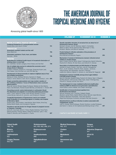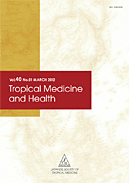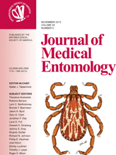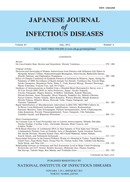
MALARIA JOURNAL
Scope & Guideline
Unraveling the complexities of malaria for a healthier world.
Introduction
Aims and Scopes
- Epidemiology and Transmission Dynamics:
Research focusing on the epidemiological aspects of malaria, including transmission patterns, risk factors, and the impact of environmental and climatic changes on malaria incidence. - Vector Biology and Control:
Studies investigating the biology, ecology, and behaviour of malaria vectors, particularly Anopheles species, and the development of innovative vector control strategies. - Drug Resistance and Therapeutic Efficacy:
Research examining the efficacy of antimalarial treatments, the emergence of drug resistance, and the molecular mechanisms underlying this resistance. - Public Health Interventions and Policy:
Evaluations of public health strategies for malaria control, including community engagement, mass drug administration, and the effectiveness of interventions like insecticide-treated nets and indoor residual spraying. - Genomic and Molecular Studies:
Investigations into the genetic diversity of malaria parasites, molecular diagnostics, and the role of genetic factors in malaria susceptibility and treatment outcomes. - Clinical Research and Management:
Clinical studies focusing on the management of malaria in various populations, including vulnerable groups such as pregnant women and children, and the impact of co-infections. - Socioeconomic and Cultural Factors:
Research exploring the social determinants of malaria transmission, including community knowledge, attitudes, and practices regarding prevention and treatment.
Trending and Emerging
- Integrated Vector Management:
A growing trend in research focusing on integrated approaches that combine various methods for vector control, including genetic strategies and community engagement. - Impact of Climate Change on Malaria:
Increasing studies investigating how climate variability and environmental changes affect malaria transmission dynamics and population health. - Molecular Surveillance for Drug Resistance:
Emerging emphasis on the molecular surveillance of drug resistance markers and the genetic diversity of malaria parasites to inform treatment policies. - Community-Based Interventions:
A rise in research exploring the effectiveness of community engagement strategies, including participatory approaches and local health worker involvement in malaria management. - Innovative Diagnostic Tools:
An increase in studies evaluating new diagnostic technologies, such as rapid diagnostic tests and molecular techniques, aimed at improving the detection and management of malaria. - Health Systems Strengthening:
Research focusing on strengthening health systems to improve malaria control efforts, particularly in low-resource settings, has become increasingly prominent.
Declining or Waning
- Traditional Vector Control Methods:
There is a noticeable decrease in studies focused solely on traditional methods like indoor residual spraying and insecticide-treated nets, as new strategies and integrated approaches gain traction. - Basic Science Research:
While foundational research remains important, there appears to be a waning emphasis on purely laboratory-based studies without direct implications for field applications or public health. - Malaria in Non-Endemic Regions:
Research addressing malaria cases in non-endemic areas has become less frequent, possibly due to the focus shifting back to endemic regions where the burden is highest. - Single-Pathogen Studies:
There is a trend towards more comprehensive studies that consider multiple pathogens and co-infections, leading to a decline in research focused solely on malaria without considering its interactions with other diseases.
Similar Journals

JOURNAL OF VECTOR BORNE DISEASES
Bridging gaps in understanding vector-borne diseases globally.JOURNAL OF VECTOR BORNE DISEASES, published by Wolters Kluwer Medknow Publications, is an esteemed peer-reviewed journal dedicated to advancing the understanding of vector-borne diseases, a significant concern in global health. Established in 2003, this open-access journal has fostered a rich repository of research, spanning clinical studies, epidemiology, and control strategies related to diseases transmitted by vectors like mosquitoes and ticks. With its impact continuing to grow, as evident from its Q3 quartile rankings in Infectious Diseases and Medicine (miscellaneous) categories in 2023, the journal provides a critical platform for researchers and healthcare professionals to disseminate findings that inform policy and practice. With the aim of highlighting contemporary issues and innovations in the field, it is vital for ongoing discussions and advancements in vector-borne disease management. Evaluation metrics from Scopus, although currently positioned in the lower percentiles, underscore the journal's importance as an emerging source of scholarly information in parasitology and immunology. By adhering to its open-access model since 2012, the journal ensures that its valuable content is readily accessible, facilitating widespread knowledge transfer and collaboration among scholars and practitioners alike.

AMERICAN JOURNAL OF TROPICAL MEDICINE AND HYGIENE
Shaping the future of tropical health research.The American Journal of Tropical Medicine and Hygiene, published by the American Society of Tropical Medicine & Hygiene, serves as a pivotal platform for the dissemination of innovative research and clinical findings in the realm of tropical medicine and health. With an illustrious history dating back to 1945, this journal has maintained its commitment to enhancing global health, particularly in the fields of Infectious Diseases, Parasitology, and Virology. It currently boasts an impressive impact factor and ranks in the Q1 category for Parasitology and Q2 for Infectious Diseases and Medicine (miscellaneous), highlighting its academic prominence. The journal's mission is to advance research, showcase cutting-edge studies, and foster collaboration among researchers, healthcare professionals, and students dedicated to tackling tropical diseases and improving public health worldwide. While access is not open, the journal remains a critical resource for anyone looking to stay informed on the latest advancements in the field.

Journal of Parasitology Research
Advancing the Frontiers of ParasitologyJournal of Parasitology Research, published by HINDAWI LTD, is a pivotal open-access journal that has been disseminating groundbreaking research in the field of parasitology since 2009. With an ISSN of 2090-0023 and an E-ISSN of 2090-0031, this journal strives to provide researchers, professionals, and students with accessible and high-impact studies that advance understanding of parasitic diseases and their epidemiology. The journal currently holds a Q3 ranking in Infectious Diseases and a Q2 ranking in Parasitology, indicating its significant contribution to the academic community. Furthermore, with a Scopus ranking placing it at #39 in Parasitology and #186 in Infectious Diseases, it plays an essential role in shaping research directions in these fields. As an open-access journal, Journal of Parasitology Research enhances the visibility and accessibility of published works, ensuring crucial findings reach a global audience. With a focus on innovative research, the journal welcomes submissions that explore both theoretical frameworks and practical applications in parasitology, making it an invaluable resource for those dedicated to combating parasitic infections.

Epidemiology and Health
Bridging gaps in knowledge for healthier communities.Welcome to Epidemiology and Health, a premier open-access journal dedicated to advancing knowledge in the fields of epidemiology and public health. Published by the Korean Society of Epidemiology since 1979, this journal serves as a vital platform for researchers, professionals, and students alike, promoting innovative research and robust discussion surrounding public health issues. Based in South Korea, it boasts a commendable Q2 ranking in the categories of Epidemiology, Public Health, and Environmental and Occupational Health, reflecting its significant contribution to the scientific community. With its current impact factor ranking it favorably among peers—#124 out of 665 in Public Health and #40 out of 148 in Epidemiology—Epidemiology and Health continues to uphold its mission of disseminating high-quality, peer-reviewed research. The journal's commitment to open access ensures that vital epidemiological insights reach a broad audience, supporting the collective goal of improving global health outcomes. Engage with pioneering studies and emerging trends within these critical fields, as we work towards a healthier future.

Tropical Medicine and Health
Innovating solutions for infectious challenges in tropical regions.Tropical Medicine and Health is a prestigious open-access journal published by BMC that serves as a vital platform for researchers and health professionals focusing on the fields of tropical medicine, infectious diseases, and public health. With an ISSN of 1348-8945 and an E-ISSN of 1349-4147, the journal has established itself in the academic community since its inception in 2004, bridging the gap between research and real-world applications in managing tropical diseases. Recognized for its quality, it holds a commendable Q2 ranking in both the Infectious Diseases and Public Health, Environmental and Occupational Health categories, positioned in the 2023 Scopus rankings within the 85th and 74th percentiles, respectively. Researchers can access high-quality, peer-reviewed articles that contribute significantly to advancing knowledge in the field. With a commitment to fostering open scientific dialogue, Tropical Medicine and Health is not just a journal, but a collaborative space for researchers, students, and practitioners working to improve health outcomes in tropical regions worldwide.

JOURNAL OF MEDICAL ENTOMOLOGY
Illuminating the impact of insect vectors on health.JOURNAL OF MEDICAL ENTOMOLOGY, published by Oxford University Press, is a prestigious journal dedicated to advancing the field of medical entomology, a critical area of study that explores the intersection of insect biology and public health. With an ISSN of 0022-2585 and an E-ISSN of 1938-2928, the journal features high-quality research articles and reviews that delve into the impacts of insect vectors on infectious diseases and parasitology, making it an essential resource for professionals and researchers alike. The journal has garnered significant recognition in the academic community, currently ranking in the top quartiles: Q2 in Infectious Diseases, Q1 in Insect Science, Q2 in Parasitology, and Q1 in Veterinary (miscellaneous), reflecting its influential contributions to these disciplines. With its comprehensive coverage of topics spanning across medical entomology and veterinary sciences, authors and readers will find a platform rich in valuable insights and data. The journal's long-standing history, dating back to its inception in 1964, ensures a legacy of excellence that continues through 2024 and beyond. While it does not currently offer open access, researchers are highly encouraged to engage with its content to foster a deeper understanding of the crucial role that insects play in human and animal health.

JAPANESE JOURNAL OF INFECTIOUS DISEASES
Championing excellence in the study of infectious diseases.The Japanese Journal of Infectious Diseases, published by the National Institute of Infectious Diseases in Japan, serves as a vital platform for researchers, clinicians, and public health professionals committed to advancing the field of infectious disease science. With an ISSN of 1344-6304 and an E-ISSN of 1884-2836, this journal has maintained its academic rigor since its inception in 1961 and continues to contribute significantly to the global understanding of infectious diseases. The journal holds a Q3 ranking in the categories of Infectious Diseases, Miscellaneous Medicine, and Medical Microbiology as of 2023, reflecting its important role in disseminating impactful research. With many articles available through Open Access, it ensures wide accessibility to the latest discoveries and insights. Researchers can expect to find high-quality studies that address critical challenges in the control and prevention of infectious diseases, making this journal an essential resource for anyone engaging in this critical field.

EPIDEMIOLOGY AND INFECTION
Championing Open Access to Transform Health ResearchEPIDEMIOLOGY AND INFECTION is a premier open-access journal published by Cambridge University Press, dedicated to advancing the field of epidemiology and infectious diseases. With an ISSN of 0950-2688 and E-ISSN of 1469-4409, this journal has been at the forefront of disseminating impactful research since its inception in 1970. As of 2023, it holds a prestigious Q2 ranking in both the fields of Epidemiology and Infectious Diseases, reflecting its significant contribution to these critical areas of study, with Scopus rankings placing it at #70 in Epidemiology and #163 in Infectious Diseases. The journal aims to publish high-quality, peer-reviewed studies that contribute to our understanding and management of infectious diseases globally. Operating under an open-access model since 2020, EPIDEMIOLOGY AND INFECTION ensures that research is accessible to a wide audience, fostering collaboration and innovation among researchers, professionals, and students alike. With a commitment to excellence, this journal is an essential resource for those looking to stay abreast of the latest developments in epidemiological research and infectious disease management.

Infectious Diseases and Clinical Microbiology
Exploring the frontiers of microbiological science and health.Infectious Diseases and Clinical Microbiology is a pivotal journal dedicated to advancing our understanding of infectious diseases through rigorous scientific research and clinical practices. Published by DOC DESIGN INFORMATICS CO LTD, this journal serves as a vital platform for researchers, healthcare professionals, and students keen on enhancing their knowledge of microbiological sciences and the clinical implications of infectious agents. With an ISSN of 2667-646X, it aims to disseminate significant findings in the field, enriching the scholarly dialogue surrounding infectious diseases. While currently operating under a traditional access model, the journal encourages global collaboration and knowledge sharing, striving to make a meaningful impact in tackling the challenges posed by infectious diseases. Its content aims to bridge the gap between laboratory research and clinical application, making it an essential resource in the contemporary landscape of global health.

Current Research in Parasitology & Vector-Borne Diseases
Empowering researchers with open access to vital findings.Current Research in Parasitology & Vector-Borne Diseases, published by ELSEVIER, is an influential journal dedicated to advancing the understanding of parasitology and vector-borne diseases. With an ISSN of 2667-114X, this journal is highly esteemed in the field, holding a prestigious Q1 quartile ranking in categories such as Animal Science and Zoology, Insect Science, and Parasitology, as well as a notable Q2 ranking in Virology for 2023. The journal's focus spans a crucial intersection of disciplines, offering a platform for innovative research that directly addresses global health challenges posed by parasites and vectors. Researchers benefit from its robust open-access model, which facilitates unrestricted dissemination of knowledge, making essential findings accessible to a wider audience. The journal continues to play a pivotal role in fostering scholarly dialogue and interdisciplinary collaboration within the scientific community, serving as a vital resource for professionals, students, and academicians interested in the dynamic and evolving field of parasitology.